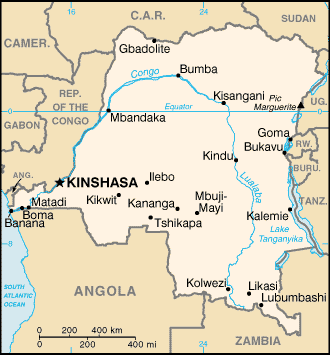DRC

The Democratic Republic of Congo (DRC) has an estimated population of 67 million (UN, 2010). The capital is Kinshasa. The DRC has an area of 2.34 million sq km (905,354 sq miles). The main languages are French, Lingala, Kiswahili, Kikongo, and Tshiluba.
The DRC became independent in 1960. Since independence, the country has been overwhelmed by political and social instability. It is estimated that three millions people have lost their lives in the DRC war, either as a direct cause of the war or poverty. The countries immense resource wealth, coupled with the massive flow of refugees from Rwanda and Burundi and the presence of the Lord's Resistance Army (LRA) have fuelled the war in DRC.
Combatants use gang rapes, rapes, and sexual mutilation as weapons of war to terrorize the population. Women are repeatedly raped and sometimes held as sex slaves. The principal perpetrators of these crimes are the armed group combatants and government soldiers. Because of the culture of impunity, rape victims have no chance of getting justice.
- DRC ratified the Protocol to the African Charter on Human and Peoples' Rights on the Rights of Women in Africa (The Maputo Protocol) on the 9th of June 2008.
- The Convention on the Elimination of All Forms of Discrimination against Women (CEDAW) was ratified by DRC on the 17th of October 1986.
- DRC launched its National Action Plan on United Nations Security Council Resolution 1325 (UNSCR 1325) in June 2010.
- There is a large UN peacekeeping mandate in DRC:United Nations Mission in the Democratic Republic of the Congo (MONUC) which is the UN largest peacekeeping mission. It was renamed as MONUCO ( United Nations Organization Stabilization Mission in the Republic Democratic of Congo) on the 1st of July 2010.
